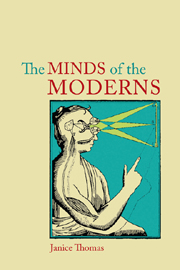Book contents
- Frontmatter
- Contents
- Acknowledgements
- Abbreviations
- Introduction
- I Descartes
- II Spinoza
- III Leibniz
- 11 Is the mind a substance for Leibniz?
- 12 Self-knowledge and the monads
- 13 Leibniz on consciousness and unconscious perceptions
- 14 Leibniz and the problem of mental causation
- 15 Leibniz and representation
- IV Locke
- V Berkeley
- VI Hume
- Conclusion
- Bibliography
- Index
13 - Leibniz on consciousness and unconscious perceptions
from III - Leibniz
- Frontmatter
- Contents
- Acknowledgements
- Abbreviations
- Introduction
- I Descartes
- II Spinoza
- III Leibniz
- 11 Is the mind a substance for Leibniz?
- 12 Self-knowledge and the monads
- 13 Leibniz on consciousness and unconscious perceptions
- 14 Leibniz and the problem of mental causation
- 15 Leibniz and representation
- IV Locke
- V Berkeley
- VI Hume
- Conclusion
- Bibliography
- Index
Summary
Because Leibniz believes that there are many perceptions in any human mind that pass unnoticed, he is often credited with introducing the notion of the unconscious into theory of mind. As we have seen, Descartes did not hold precisely the crude theory of mental transparency, according to which there is nothing in any mind that is not fully consciously apprehended by that mind. But Leibniz certainly takes Descartes to hold this, and he is convinced it is quite mistaken.
Leibniz's position is at once more subtle and more credible than Descartes's, even the more plausible interpretation suggested for Descartes in Chapters 2 and 3 above. For Leibniz there can be perceptions that come and go completely unnoticed in a subject's mind because they are too weak or too confused to be conscious. There is also the possibility of even a strong clear perception passing completely unnoticed, either because the subject is habituated to it or because it is drowned out by quantities of other perceptions or the superior distraction of some very insistent or emotionally charged perception.
The name that Leibniz gives to those perceptions which remain below the threshold of conscious experience is “petites perceptions”. This phrase is usually translated “minute perceptions”, meaning that they are low in strength or intensity. Such perceptions occur when the subject is in a dreamless sleep or has fainted.
- Type
- Chapter
- Information
- The Minds of the ModernsRationalism, Empiricism and Philosophy of Mind, pp. 120 - 125Publisher: Acumen PublishingPrint publication year: 2009

